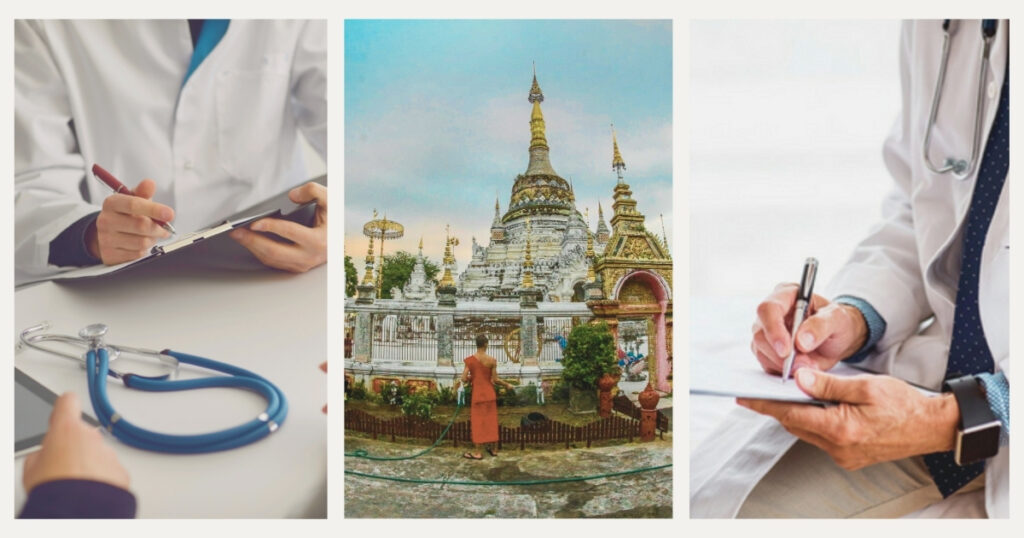Understanding health insurance for foreigners in Thailand is essential for anyone planning to work remotely from this vibrant Southeast Asian hub. As Thailand continues to attract digital nomads with its tropical lifestyle, excellent infrastructure, and emerging tech scene, ensuring proper healthcare coverage becomes a crucial part of your relocation strategy. Whether you’re coding from a Chiang Mai café or managing projects from a Koh Samui beachfront, having the right insurance coverage can make all the difference.
Nomada is here to help! This comprehensive guide covers everything digital nomads need to know about navigating Thailand’s healthcare system, choosing private insurance plans, and ensuring continuous medical coverage during your stay.
How Thailand’s healthcare system works

Thailand boasts a dual healthcare system, with both public and private sectors offering a wide range of medical services. However, the public system is designed primarily for Thai citizens and long-term residents.
Public healthcare in Thailand
Public healthcare in Thailand is government-subsidized and provides affordable medical care through public hospitals and clinics. While it is accessible to foreigners contributing to the social security system, most expats and digital nomads rely on private health insurance to cover their medical needs. Public facilities are known for their affordability but may involve long waiting times and limited English-speaking staff.
Private healthcare in Thailand
Private hospitals in Thailand are internationally recognized for their high-quality care, modern facilities, and shorter wait times. For those without access to public healthcare, health insurance for foreigners in Thailand is essential to cover the costs of private medical services. Private hospitals like Bumrungrad International Hospital in Bangkok and Phuket International Hospital offer world-class services at competitive rates, making them popular among expats and travelers.
💡 Did you know? Thailand is one of the leading destinations for medical tourism, thanks to its advanced private healthcare services and affordability compared to Western countries.
Regional healthcare considerations in Thailand

Healthcare quality and accessibility can vary significantly across different regions of Thailand, making it important to understand these variations when choosing your base.
Urban vs. rural healthcare access
Major cities like Bangkok, Chiang Mai, and Phuket offer world-class medical facilities with international accreditation. However, healthcare options become more limited in rural areas and smaller islands. Understanding these regional differences is crucial when selecting both your location and insurance coverage.
Seasonal health considerations
Thailand’s climate can significantly impact healthcare needs throughout the year. During the monsoon season (typically July to October), certain areas may experience flooding that can affect access to medical facilities. Air quality issues during the burning season in the north (February to April) may also require additional healthcare considerations.
Regional medical specializations
Different regions in Thailand have developed specialized medical expertise. Bangkok is renowned for advanced medical procedures and specialized treatments. Phuket excels in wellness and rehabilitation services, while Chiang Mai has become known for alternative and holistic medicine options. Understanding these regional specializations can help you choose the right location and coverage for your specific health needs.
💡 Did you know? Many insurance providers in Thailand now offer coverage for traditional Thai medicine and alternative treatments when prescribed by licensed practitioners.
Why private health insurance is essential for digital nomads

Private health insurance is a must for digital nomads who want peace of mind while living or traveling in Thailand. Without insurance, even routine medical services can result in significant out-of-pocket costs, especially at private hospitals.
Coverage provided by private insurance plans
Comprehensive private insurance plans typically include coverage for inpatient and outpatient care, specialist consultations, emergency medical services, and diagnostic tests. Some policies also offer additional benefits like dental and vision care, mental health support, and maternity coverage. For frequent travelers, international health insurance plans provide the added benefit of coverage in multiple countries.
Choosing the right health insurance plan
When selecting health insurance for foreigners in Thailand, consider factors such as your medical needs, the scope of coverage, and network hospitals included in the plan. International providers like Cigna and Allianz offer tailored plans for expats, while local Thai insurers often provide more affordable options with excellent regional coverage.
💡 Pro tip: compare multiple plans to find the best balance between cost, coverage, and access to private hospitals in Thailand.
Costs of healthcare and insurance in Thailand

Healthcare in Thailand is generally more affordable than in many Western countries, but the costs can still add up without insurance. A visit to a public hospital might cost ฿500 to ฿1,000, while consultations at private hospitals can range from ฿2,000 to ฿10,000. Emergency care or hospital stays in private facilities can quickly exceed ฿50,000, making health insurance for foreigners in Thailand a crucial investment.
Private health insurance plans vary in price, with basic policies starting at ฿1,500 per month and more comprehensive coverage costing up to ฿10,000 per month. These costs depend on factors like age, health condition, and the extent of the coverage.
💡 Did you know? Many health insurance plans include optional coverage for emergency medical evacuation, which is especially valuable for remote locations or severe emergencies.
Digital infrastructure and healthcare access in Thailand

Thailand’s healthcare system has embraced digital transformation, making it increasingly accessible for tech-savvy digital nomads. Understanding the digital landscape is crucial for managing your healthcare effectively.
Digital health services and telemedicine
Many private hospitals in Thailand now offer sophisticated patient portals and mobile apps for appointment scheduling, medical records access, and telemedicine consultations. Major hospital groups like Bangkok Hospital and Bumrungrad International provide comprehensive digital platforms with English-language support.
🌟 Pro tip: stay connected to Thailand’s digital health services with Holafly’s eSIM. Their reliable coverage ensures you can access telemedicine services and emergency healthcare support whether you’re in bustling Bangkok or on a remote island.
Online healthcare resources
Thailand’s healthcare system offers various digital tools for foreigners, from hospital directories to emergency service locators. Many private hospitals have dedicated international patient coordinators available through online channels, making it easier to navigate the system remotely.
Emergency medical assistance apps
Thailand’s major hospitals and insurance providers have developed sophisticated emergency assistance apps that can be crucial in critical situations. These apps typically offer features like GPS location sharing with emergency services, one-touch ambulance calling, and real-time translation services. Some apps even maintain your medical history and insurance information, making it instantly available to healthcare providers in emergencies.
🌟 Pro tip: download and set up your hospital’s emergency assistance app before you need it. Many apps allow you to pre-register your insurance details and medical history, saving precious time during emergencies.
💡 Did you know? Several Thai hospitals have developed partnerships with international telemedicine providers, allowing patients to consult with specialists worldwide while receiving care in Thailand.
Tips for digital nomads: finding the best health insurance for foreigners in Thailand

Navigating health insurance for foreigners in Thailand doesn’t have to be complicated. Follow these tips to find the best plan for your lifestyle and budget:
- Assess your needs: consider whether you require inpatient care, outpatient treatments, or additional benefits like dental and mental health services.
- Research providers: compare plans from international insurers like AXA or Aetna and local Thai providers to find the best combination of coverage and affordability.
- Check hospital networks: ensure your chosen plan includes top private hospitals, such as Bangkok Hospital or Bumrungrad International, for seamless access to care.
- Understand visa requirements: certain Thai visas, like the Digital Nomad Visa, require proof of health insurance with minimum coverage levels.
- Review policy details: look for exclusions and limits in the policy, especially if you engage in adventurous activities like scuba diving or trekking.
And don’t forget your Thai driver’s license if you plan on getting around by car!
💡 Pro tip: opt for a plan with 24/7 customer support to navigate claims and healthcare access more easily.
Ready to secure your health insurance in Thailand?
Having the right health insurance for foreigners in Thailand ensures you have access to quality medical care, whether for routine check-ups or emergencies. Thailand offers excellent healthcare, but costs can vary significantly between public and private hospitals. By choosing a plan that fits your needs, you can enjoy peace of mind, knowing you’re protected from unexpected medical expenses while making the most of your time in Thailand.
🌍 Get started today! Explore Nomada’s health insurance resources or learn more about taxes for foreigners in Thailand to plan your digital nomad journey with confidence.
Frequently asked questions about health insurance for foreigners in Thailand
While health insurance isn’t mandatory for all visas, certain visas, like long-term retirement or digital nomad visas, require proof of coverage.
Public healthcare is available to foreigners who contribute to the social security system, but most rely on private insurance for faster access and better facilities.
Private health insurance costs range from ฿1,500 to ฿10,000 per month, depending on coverage and the provider.
Many private plans include prescription medication coverage, but it’s essential to check the specifics of your policy.
You’ll need to pay out-of-pocket, which can be expensive. Having health insurance ensures financial protection during emergencies.
Most international health insurance plans offer coverage across Southeast Asia, but the extent of coverage can vary. Some plans include medical evacuation to Singapore or Bangkok for serious conditions. It’s important to verify the geographical coverage and any restrictions on frequent border crossings.
Many comprehensive insurance plans cover treatment for tropical diseases, but some may have exclusions or waiting periods. Look for plans that specifically include coverage for dengue fever, malaria, and other tropical illnesses common in Southeast Asia. Some plans also cover preventive treatments and vaccinations.
Coverage for alternative medicine varies by provider. Some international plans now include Traditional Chinese Medicine (TCM) and Thai traditional medicine when prescribed by licensed practitioners. However, coverage limits and conditions apply, so it’s important to check the specific terms of your policy.




